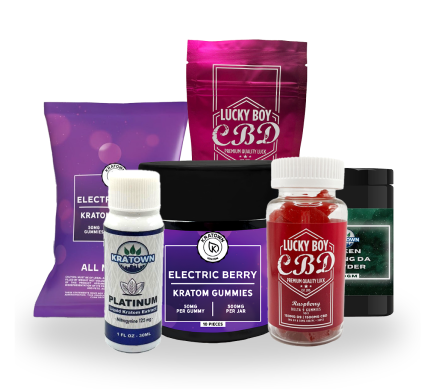
Debunking 5 Common Kratom Myths
Ever feel like you’re trying to decipher a soap opera when someone starts debating the pros and cons of kratom? Let’s cut through the drama.
Kratom, a natural plant-derived substance, has grown in use as a wellness aid, but misinformation often makes it unclear. With so much conflict, it’s no wonder people are left scratching their heads while searching for kratom capsules for sale.
Let’s separate fact from fiction as we try to understand the truth behind this often misunderstood plant and its real benefits and risks. Here are five common kratom myths (and the truth behind them).
Myth #1: Kratom Is Just Another Dangerous, Addictive Drug
Fiction
Kratom sometimes gets lumped in with hardcore opioids like oxycodone, morphine, and heroin, with opponents calling it a highly addictive drug that has unbearable withdrawal symptoms.
Fact
Kratom works with the opioid receptors in your brain, but its chemical behavior is significantly different. Unlike traditional opioids, kratom doesn’t cause respiratory depression, which is a major risk associated with fatal overdoses.
Kratom’s main alkaloids, which are mitragynine and 7-hydroxymitragynine, have unique properties and are not found in opioid or synthetic drug formulations. Nor does kratom contain opium, a key component of such drugs.
Dependence on kratom can occur with heavy, prolonged use, but its risk is significantly lower compared to prescription opioids.
Kratom does interact with opioid receptors, but saying it’s the same as heroin is like saying a tricycle is the same as a race car because they both have wheels.
Using Kratom Safely
So, although kratom has a safer profile, still use it responsibly. Consider taking a deliberate break from kratom for a few days or a week to restore your body’s sensitivity to its effects and minimize dependence. With mindful practice, you can avoid negative patterns and rediscover the effectiveness of kratom for productivity.
Myth #2: All Kratom Products Are Equal
Fiction
Some say that kratom is kratom, and all the different products and varieties on the market do the same thing. It doesn’t matter which kind or where you buy it from.
Fact
The differences in preparation and quality matter a lot. Whether it’s at an herbal store or online, source your kratom from reputable vendors. Read many verified customer reviews and use your best judgment to avoid scams when deciding if a website is professional.
Buying cheap, poorly-stored kratom is like buying a half-flat bottle of soda—it’s just a waste of everyone’s time. Plus, kratom coming from an unreliable or shady vendor could have several terrible consequences, including putting your health at risk if it’s mixed with synthetic chemicals or other harmful fillers.
Myth #3: Kratom Doesn’t Have Shelf Life Problems
Fiction
Whether it’s in the medicine cabinet or a bottle in your purse, you can store kratom forever, just like Grandma’s fruitcake.
Fact
As nice as that may be, properly storing your kratom is key to keeping it fresh for the longest. But even then, it doesn’t stay good forever. Red, green, white, or even trainwreck kratom powder can remain fresh for three to six months with the proper handling. But after that, it’s best to buy a new batch. No one wants stale kratom anyway.
You can keep kratom potent and ready for enjoyment by keeping it in freezer bags or sealed jars in a dry environment. Putting a little effort into storing your kratom right lets you get the best and most prolonged use out of it.
Myth #4: Kratom Is Illegal Everywhere
Fiction
Owning, buying, or selling kratom anywhere will land you in jail.
Fact
While kratom is banned in some areas, it’s legal federally in the U.S. and widely available in many states. However, each state and locality has regulations, so the legal situation can look like a quirky patchwork quilt in some places.
For an authoritative resource on kratom’s legality where you live, refer to information and legality maps provided by the American Kratom Association.
Myth #5: Kratom Isn’t Backed by Science
Fiction
There isn’t any scientific evidence to prove that kratom works or is safe.
Fact
It’s easy to jump to conclusions, but let’s set the record straight. Kratom’s safety, efficacy, and potential uses are still being studied—and science doesn’t happen overnight.
Researchers are exploring its alkaloids, like mitragynine, for possible health benefits and its lowered potential for addiction compared to traditional opioids. More work is needed to draw firm conclusions.
So, if kratom could weigh in, it’d probably say, “Can you chill? I’m still being studied.”
Setting the Record Straight
Kratom’s misunderstood reputation stems from a blend of unclear regulations, occasional misclassification, and a handful of unscrupulous vendors or buyers muddying the waters. By navigating the myths, you can separate scare tactics from genuine safety concerns.
Choose kratom sellers who prioritize transparency and don’t fall for every dramatic headline. Informed decisions lead to better, safer kratom experiences.
At the end of the day, kratom isn’t a magic unicorn—but it’s far from the bogeyman it’s sometimes made out to be. With the facts on your side, you can explore its potential responsibly and confidently.
Video
Infographic
Kratom, a natural plant-derived substance, has gained popularity as a wellness aid, though misinformation often clouds its perception. Let’s clear up the myths and facts about kratom’s benefits and risks. This infographic highlights five common myths and the truths behind them.


